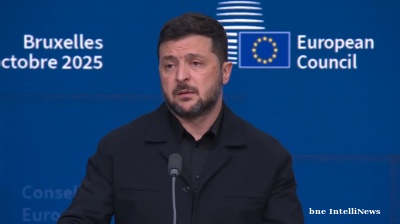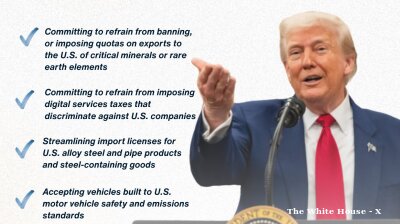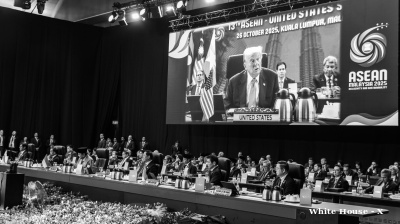The Baltic states presented a calm front on November 9 in reaction to the shock victory of Donald Trump in the US presidential election, despite the Republican's comments during the campaign questioning the readiness of Nato to defend all members, and praising Russia's President Vladimir Putin.
For Estonia, Latvia and Lithuania, formerly part of the Soviet Union, two of them host to large ethnic Russian populations, and tested for years by Moscow's efforts to retain leverage, power in Washington matters primarily in terms of security. Russia’s intervention in Ukraine in 2014 spooked the trio, which have remained on high alert ever since against what they claim is a hybrid war waged against them by the Kremlin as part of its renewed imperial ambition.
Unsurprisingly, Baltic officials rushed to congratulate Trump, but they were also keen to underline the importance of relations with the US and the superpower’s responsibilities in Nato. Trump suggested earlier this year that he has questions over Article 5 of the Nato treaty which commits the alliance to respond as one to any attack on any member.
“The United States of America's voters have made their choice," Latvian President Raimonds Vejonis said in a statement. "I congratulate the newly elected US President Donald Trump on his victory in the elections. We will continue to work together, ensuring both collective defense and the fight against terrorism, as well as other modern security challenges."
Estonian Foreign Minister Jurgen Ligi was more direct in comments to local media. “Not knowing what to expect certainly doesn't make the situation safer, but there were no signs of agreements that would push the current security balance in the wrong direction,” the official told ERR.
“This reset [of the US-Russia relations] has been attempted repeatedly earlier as well, but Russia’s objectives and value judgments didn’t support it. And the US security authorities are very professional, like Congress as well, which influences foreign policy a lot,” Ligi added hopefully.
Conviction
However, with Trump now headed to the White House, many in the region are wondering just how deeply he means to challenge the Nato treaties, or what his relations with Putin will entail. The Russian leader has blasted Nato's recent decisions to post extra troops and weapons in north-eastern Europe. Moscow has raised the ante by sending nuclear capable missiles to the Kaliningrad enclave, which borders Poland and Lithuania, and adding to its Baltic Sea fleet.
Many wonder if the extra Nato troops will now arrive. "If Trump follows through on some of his electoral pronouncements, the notion of a permanent deployment of a Nato contingent in the Baltic (including Poland) may be reversed," suggests Wolfango Piccoli at Teneo Intelligence.
The worries are shared by Poland, which stands by the Baltic states as a regional hawk. The PiS government is fervently anti-Russian, and has repeatedly warned the West of the dangers stemming from Moscow.
“During this year's Nato Summit in Warsaw the US decided to increase its military presence in Poland, thereby strengthening the alliance's Eastern flank,” President Andrzej Duda said in a letter ostensibly congratulating Trump on his victory. “We sincerely hope that your leadership will open new opportunities for our cooperation based on mutual commitment."
Trump caused furore in the region when, in July, he said the US would help the Baltic states if attacked by Russia only “if they fulfil their obligations to us".
The president-elect was referring to Nato's rule on defence spending, which calls for each member to commit 2% of GDP. Poland and Estonia are among the four European members that meet that obligation. Latvia and Lithuania are amongst the remaining 23 that do not, although both have announced plans to hike spending.
News

Milei celebrates resounding victory in Argentina's midterm elections
Argentine President Javier Milei scored a major win for his La Libertad Avanza (LLA) party in Argentina's October 26 midterm legislative elections, as the party obtained approximately 40.84% of the nationwide vote with 99.14% of the votes counted.

Zelenskiy accuses China of aiding Russia’s war effort through industrial and military support
Ukrainian President Volodymyr Zelenskiy accused China of materially supporting Russia’s military-industrial complex, providing key technologies and resources that have enabled Moscow to sustain and scale its war effort against Ukraine.

US Treasury Secretary Bessent blasts “Russian propagandist” special envoy Dmitriev in Washington PR debacle
A trip to Washington by the Kremlin’s special business envoy Kirill Dmitriev days after the US imposed new oil sanctions turned into a debacle after US Treasury Secretary Scott Bessent blasted him as a “Russian propagandist.”

Trump pledges enduring support for Southeast Asia as new trade deals signed
During his visit to Southeast Asia, US President Donald Trump declared that Washington would remain a steadfast ally to the region, as he signed a series of trade agreements with four ASEAN member states.




